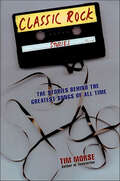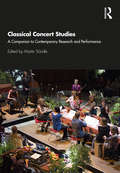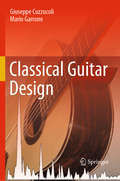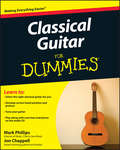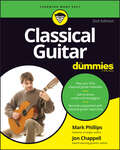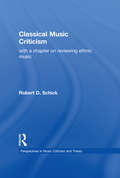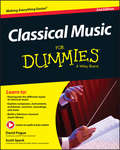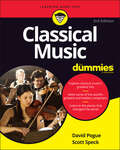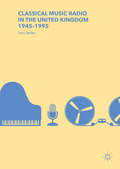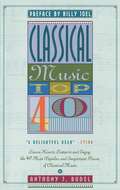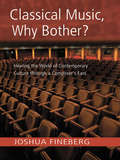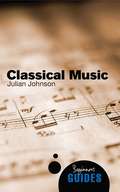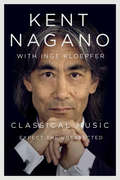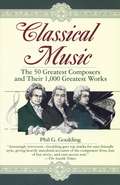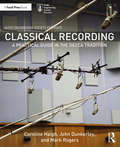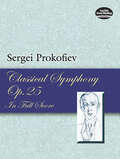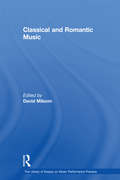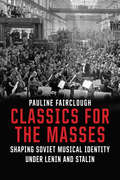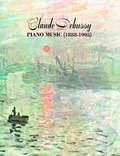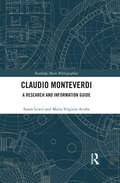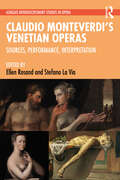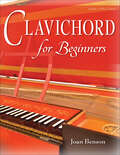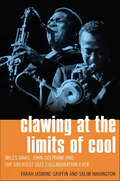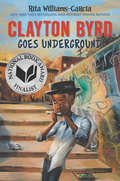- Table View
- List View
Classic Rock Stories: The Stories Behind the Greatest Songs of All Time
by Tim MorseThe first time on the open road with Dad's beat-up clunker and a brand-new driver's lecense. That first kiss. Practicing Steve Tyler moves in the garage. Lazy summer days with nothing to do but hang out with a group of friends and the radio. Classic Rock. In Classic Rock Stories, classic rockers reveal the sometimes painful, sometimes accidental, and often hilarious process of creating the songs that you can still sing aloud. In their own words, rockers like Pete Townshend, John Lennon, Stevie Nicks, Elton John, and Keith Richards tell about the drugs, the pain, the love gone bad, and the accidents that resulted in the hits.
Classical Concert Studies: A Companion to Contemporary Research and Performance
by Martin TröndleClassical Concert Studies: A Companion to Contemporary Research and Performance is a landmark publication that maps out a new interdisciplinary field of Concert Studies, offering fresh ways of understanding the classical music concert in the twenty-first century. It brings together essays, research articles, and case studies from scholars and music professionals including musicians, music managers, and concert designers. Gathering both historical and contemporary cases, the contributors draw on approaches from sociology, ethnology, musicology, cultural studies, and other disciplines to create a rich portrait of the classical concert’s past, present, and future. Based on two earlier volumes published in German under the title Das Konzert (The Concert), and with a selection of new chapters written for the English edition, this companion enables students, researchers, and practitioners in the classical and contemporary music fields to understand this emerging field of research, go beyond traditional disciplinary boundaries and methodologies, and spark a renaissance for the classical concert.
Classical Concert Studies: A Companion to Contemporary Research and Performance
by Martin TröndleClassical Concert Studies: A Companion to Contemporary Research and Performance is a landmark publication that maps out a new interdisciplinary field of Concert Studies, offering fresh ways of understanding the classical music concert in the twenty-first century. It brings together essays, research articles, and case studies from scholars and music professionals including musicians, music managers, and concert designers. Gathering both historical and contemporary cases, the contributors draw on approaches from sociology, ethnology, musicology, cultural studies, and other disciplines to create a rich portrait of the classical concert’s past, present, and future.Based on two earlier volumes published in German under the title Das Konzert (The Concert), and with a selection of new chapters written for the English edition, this companion enables students, researchers, and practitioners in the classical and contemporary music fields to understand this emerging field of research, go beyond traditional disciplinary boundaries and methodologies, and spark a renaissance for the classical concert.
Classical Guitar Design
by Giuseppe Cuzzucoli Mario GarroneThis book describes the entire process of designing guitars, including the theory and guidelines for implementing it in practice. It discusses areas from acoustics and resonators to new tools and how they assist traditional construction techniques. The book begins by discussing the fundamentals of the sounds of a guitar, strings, and oscillating systems. It then moves on to resonators and acoustics within the guitar, explaining the analysis systems and evaluation methods, and comparing classic and modern techniques. Each area of the guitar is covered, from the soundboard and the back, to the process of closing the instrument. The book concludes with an analysis of historic and modern guitars. This book is of interest to luthiers wanting to advance their practice, guitar players wishing to learn more about their instruments, and academics in engineering and physics curious about the principles of acoustics when applied to musical instruments.
Classical Guitar For Dummies
by Mark Phillips Jon ChappellWant to be a classical guitarist but never had a lesson?Want to be a classical guitarist, but never had a lesson? No problem -- this hands-on guide teaches you all the fundamental techniques you need to play scales, melodies, and full-length pieces in the classical style. You get plenty of practice exercises to stretch your skills, selections from the classical repertoire, and a bonus audio CD that helps you play along with the music pieces from the book!Get acquainted with your guitar -- familiarize yourself with the unique make-up and parts of a classical guitarStart making some music -- play melodies on individual strings, move on to arpeggios, and get your fingers in shape with scalesRamp up your technique -- play barres, slurs, and trills; handle harmonics; master right-hand tremolo; and venture up the neck to play in the higher positionsBuild your classical repertoire -- from Renaissance and Baroque to Classical, Romantic, and Modern, play pieces from the major eras in classical musicPractice makes perfect -- improve your performance with expert guidance through each exercise and piece in the bookOpen the book and find:Tips and techniques for playing beautiful piecesHow to read music notation and tablatureBasic finger and thumb strokesRight- and left-hand techniquesMusical examples, charts, and photosMusic pieces from the guitar greatsThe best ways to care for your guitarA step-by-step tutorial on changing your stringsBonus CD IncludesMore than 140 recorded performances of the exercises and pieces featured in the bookPieces performed using a count-off, allowing you to play along in time with the musicTuning notes to help you tune up your guitarNote: CD-ROM/DVD and other supplementary materials are not included as part of eBook file.
Classical Guitar For Dummies
by Mark Phillips Jon ChappellDiscover the magic of classical guitar with this fun and easy guide The perfect starting point to learning classical guitar, Classical Guitar For Dummies, walks you through the steps, techniques, and styles you’ll need to finger-pick your way around some of the most beautiful songs ever written. Whether you’re a first timer looking to add your very first classical guitar to your collection or you’ve already made the jump to the classical style want to pick up some priceless tips, this book is the easy-to-read companion you’ll want at your side. You can even play along with audio and video examples at dummies.com that will help you on your journey toward classical guitar mastery. In Classical Guitar For Dummies, you’ll find: Foundational and advanced techniques, from adapting your playing posture to coloring your tone with vibrato Tips and tricks on playing classical guitar favorites, like Cavatina by Stanley Myers Explorations of classical scales, up and down the guitar neck Classical Guitar For Dummies is an essential aid for new and aspiring classical guitarists just beginning to learn their craft. More experienced guitarists seeking to improve their fundamentals and learn some new strategies for creating amazing music will also find a ton of useful info inside.
Classical Music Criticism (Perspectives In Music Criticism And Theory Ser. #Vol. 2)
by Robert D. SchickThe first new survey of the field in more than 60 years, this study concentrates on the basics of music criticism. Because it focuses on core issues and proven principles, the book is likely to become the standard work on the subject. It is written for the audience that reads music criticism in newspapers and popular journals: professional and amateur musicians, scholars, teachers, researchers, librarians, students, music lovers, journalists, and critics. The topics are covered in depth and observations are thoroughly documented, yet the material is enjoyable to read because the writing is easy to understand and special terminology is held to an absolute minimum.The commentary addresses the function of music criticism, the qualifications and training of a critic, the relationship between music criticism and other aspects of journalism, and the principles behind value judgments. Three chapters are devoted to the concert and opera review, one to reviewing recordings, another to radio and television criticism, and one to reviewing ethnic music. Thirty-eight reviews are quoted and analyzed, and 13 are presented in their entirety, along with critical commentary. Index. Appendix. Bibliography
Classical Music For Dummies
by David Pogue Scott SpeckHaydn, Tchaikovsky, and Brahms, oh, my! The beginner's guide to classical music Classical Music For Dummies is a friendly, funny, easy-to-understand guide to composers, instruments, orchestras, concerts, recordings, and more. Classical music is widely considered one of the pinnacles of human achievement, and this informative guide will shows you just how beautiful and rewarding it can be. You'll learn how Bach is different from Beethoven, how Mozart is different still, and why not all "classical" music is actually Classical if it's really Baroque or Romantic. You'll be introduced to the composers and their work, and discover the groundbreaking pieces that shake the world every time they're played. Begin building your classical music library with the essential recordings that define orchestral, choral, and operatic beauty as you get acquainted with the orchestras and musicians that bring the composers to life. Whether you want to play classical music or just learn more about it, Classical Music For Dummies will teach you everything you need to know to get the most out of this increasingly popular genre. Distinguish flute from piccolo, violin from viola, and trumpet from trombone Learn the difference between overtures, requiems, arias, and masses Explore the composers that shaped music as we know it Discover the recordings your music library cannot be without Classical music has begun sneaking into the mainstream -- if your interest has been piqued, there's never been a better time to develop an appreciation for this incredibly rich, complex, and varied body of work. Classical Music For Dummies lays the groundwork, and demonstrates just how amazing classical music can be.
Classical Music For Dummies
by David Pogue Scott SpeckClassical music was never meant to be an art for snobs! In the 1700s and 1800s, classical music was popular music. People went to concerts with their friends, they brought snacks and drinks, and cheered right in the middle of the concert. Well, guess what? Three hundred years later, that music is just as catchy, thrilling, and emotional. From Bach to Mozart and Chopin, history's greatest composers have stood the test of time and continue to delight listeners from all walks of life. And in Classical Music For Dummies, you'll dive deeply into some of the greatest pieces of music ever written. You'll also get: A second-by-second listening guide to some of history's greatest pieces, annotated with time codes A classical music timeline, a field guide to the orchestra, and listening suggestions for your next foray into the classical genre Expanded references so you can continue your studies with recommended resources Bonus online material, like videos and audio tracks, to help you better understand concepts from the book Classical Music For Dummies is perfect for anyone who loves music. It's also a funny, authoritative guide to expanding your musical horizons—and to learning how the world's greatest composers laid the groundwork for every piece of music written since.
Classical Music Radio in the United Kingdom, 1945–1995
by Tony StollerThis book is the first comprehensive account of classical music on all British radio stations, BBC and commercial, between 1945 and 1995. It narrates the shifting development of those services, from before the launch of the Third Programme until after the start of Classic FM, examining the output from both qualitative and quantitative perspectives, as well as recounting some of the stories and anecdotes which enliven the tale. During these fifty years, British classical music radio featured spells of broad, multi-channel classical music radio, with aspirational and mainstream culture enjoying positive interactions, followed by periods of more restricted and exclusive output, in a paradigm of the place of high culture in UK society as a whole. The history was characterised by the recurring tensions between elite and popular provision, and the interplay of demands for highbrow and middlebrow output, and also sheds new light on the continuing relevance of class in Britain. It is an important and unique resource for those studying British history in the second half of the twentieth century, as well as being a compelling and diverting account for enthusiasts for classical music radio.
Classical Music Top 40
by Anthony RudelIn this informal and informative guide, Rudel leads listeners through the 40 most essential and popular compositions from the Four Seasons to Rhapsody in Blue, explaining the musical structure of each passage and highlighting special themes or elements to listen for as the music continues.
Classical Music, Why Bother?: Hearing the World of Contemporary Culture Through a Composer's Ears
by Joshua FinebergFirst published in 2006. Routledge is an imprint of Taylor & Francis, an informa company.
Classical Music: A Beginner's Guide (Beginner's Guides)
by Julian JohnsonWhat does classical music mean to the Western World? How has it transformed over the centuries? What relevance does it have today? Julian Johnson inspires readers to explore over 1000 years of music, and examines how music is related to some of the big ideas of Western experience including spirituality, emotion, the weight of history, and self identity. Julian Johnson is currently Professor of Music at Royal Holloway, University of London. He is also a composer and public speaker on musicology, championing the relevance of classical music to the general public.
Classical Music: Expect the Unexpected
by Kent Nagano Inge KloepferHow relevant is classical music today? The genre seems in danger of becoming nothing more than a hobby for the social elite. Yet Kent Nagano has another world in mind – one where everyone has access to classical music. In Classical Music: Expect the Unexpected the world-famous classical conductor tells the deeply personal story of his own engagement with the masterpieces and great composers of classical music, his work with the world's major orchestras, and his tireless commitment to bringing his music to everybody. Narrating his first childhood encounters with music's power to overcome social and ethnic boundaries, he celebrates an art form that has always taken part in debates about human values and societal developments. The constantly declining relevance of classical music in these disrupted times, he argues, not only impoverishes society from a cultural perspective but robs it of inspiration, wit, emotional depth, and a sense of community. Getting to grips with classical music's existential crisis, Nagano contends that it is too crucial to humanity's survival to be allowed to silently disappear from our everyday reality. In this moving autobiography, Kent Nagano makes a compelling plea for classical music that is as exhilarating as it is thought-provoking.
Classical Music: The 50 Greatest Composers and Their 1,000 Greatest Works
by Phil G. GouldingMAKE A SOUND INVESTMENT IN CLASSICAL MUSICWho are the ten most important classical composers? Who in the world was Palestrina? Why did Stravinsky's "Rite of Spring" cause a riot? Which five of each important composer's works should you buy? What is a concerto and how does it differ from a sonata?Maybe you don't know the answers to these questions; author Phil Goulding certainly didn't. When Goulding first tried to learn about classical music, he found himself buried in an avalanche of technical terms and complicated jargon--so he decided to write the book he couldn't find.The result is a complete classical music education in one volume. Comprehensive, discriminating, and delightfully irreverent, Classical Music provides such essential information as:* Rankings of the top 50 composers (Bach is #1. Borodin is #50) * A detailed and anecdotal look at each composer's life and work * The five primary works of each composer and specific recommended CDs for each. * Further great works of each composer--if you really like him * Concise explanations of musical terminology, forms, and periods * A guide to the parts and history of the symphony orchestra "This book uses every conceivable gimmick to immerse readers in the richness of classical music: lists, rankings, sidebars devoted to lively anecdotes, and catchy leads."--The Washington Post"One terrific music appreciation book...The information is surprisingly detailed but concisely presented. Goulding's writing style is breezy yet mature....[He] has raised music appreciation from a racket to a service."--The Arizona Daily Star
Classical Recording: A Practical Guide in the Decca Tradition (Audio Engineering Society Presents)
by Mark Rogers Caroline Haigh John DunkerleyClassical Recording: A Practical Guide in the Decca Tradition is the authoritative guide to all aspects of recording acoustic classical music. Offering detailed descriptions, diagrams, and photographs of fundamental recording techniques such as the Decca tree, this book offers a comprehensive overview of the essential skills involved in successfully producing a classical recording. Written by engineers with years of experience working for Decca and Abbey Road Studios and as freelancers, Classical Recording equips the student, the interested amateur, and the practising professional with the required knowledge and confidence to tackle everything from solo piano to opera.
Classical Symphony, Opus 25: In Full Score
by Sergei ProkofievProkofiev's first symphony, which he mischievously dubbed "Classical," is a sprightly piece based on the symphonic models of Haydn. "I thought that if Haydn were alive today he would compose just as he did before, but at the same time would include something new in his manner of composition," Prokofiev remarked. "I wanted to compose such a symphony: a symphony in the classical style."The composer's synthesis of twentieth harmonies and timbres with eighteenth-century structure and form has captivated audiences since its premiere in 1918. This is Prokofiev's most frequently performed symphonic work, and this edition is meticulously reproduced from an authoritative early source.
Classical and Romantic Music (The\library Of Essays On Music Performance Practice Ser. #4)
by David MilsomThis volume brings together twenty-two of the most diverse and stimulating journal articles on classical and romantic performing practice, representing a rich vein of enquiry into epochs of music still very much at the forefront of current concert repertoire. In so doing, it provides a wide range of subject-based scholarship. It also reveals a fascinating window upon the historical performance debate of the last few decades in music where such matters still stimulate controversy.
Classics for the Masses: Shaping Soviet Musical Identity under Lenin and Stalin
by Pauline FaircloughMusicologist Pauline Fairclough explores the evolving role of music in shaping the cultural identity of the Soviet Union in a revelatory work that counters certain hitherto accepted views of an unbending, unchanging state policy of repression, censorship, and dissonance that existed in all areas of Soviet artistic endeavor. Newly opened archives from the Leninist and Stalinist eras have shed new light on Soviet concert life, demonstrating how the music of the past was used to help mold and deliver cultural policy, how "undesirable" repertoire was weeded out during the 1920s, and how Russian and non-Russian composers such as Mozart, Tchaikovsky, Wagner, Bach, and Rachmaninov were "canonized" during different, distinct periods in Stalinist culture. Fairclough's fascinating study of the ever-shifting Soviet musical-political landscape identifies 1937 as the start of a cultural Cold War, rather than occurring post-World War Two, as is often maintained, while documenting the efforts of musicians and bureaucrats during this period to keep musical channels open between Russia and the West.
Claude Debussy Piano Music 1888-1905
by Claude DebussyThis volume contains the complete music for solo piano written by Claude Debussy between 1888 and 1905. Beginning with Deux Arabesques (1888), it offers the Suite bergamasque (1890-1905), Réverie (1890), Danse (1890), Ballade (1890), Pour le piano (1896-1901), D'un cahier d'esquisses (1903), Extampes (1903), Mazurka (1891), Valse romantique (1890), Masques (1904), L'Isle joyeuse (1904), and the first series of Images (1905): Reflets dans l'eau, Hommage a Rameau, and Mouvement. In each case the music has been reproduced photographically from original or early editions. This book has been designed to be used at the piano. Noteheads are large and clearly printed: margins and spaces are adequate for written notes, fingerings, and turnovers. It is also most useful, of course, for analysis or simply for listening along with the music.
Claudio Monteverdi: A Research and Information Guide (Routledge Music Bibliographies)
by Susan Lewis Maria Virginia AcuñaClaudio Monteverdi: A Research and Information Guide is an annotated bibliography that navigates the vast scholarly resources on the composer with the most updated compilation since 1989. Claudio Monteverdi transformed and mastered the principal genres of his day and his works influenced generations of musicians and other artists. He initiated one of the most important aesthetic debates of the era by proposing a new relationship between poetry and harmony. In addition to scholarship by musicologists and music theorists, Monteverdi’s music has attracted attention from literary scholars, cultural historians, and critical theorists. Research into Monteverdi and Renaissance and early baroque studies has expanded greatly, with the field becoming more complex as scholars address such issues as gender theory, feminist criticism, cultural theory, new criticism, new historicism, and artistic and popular cultures. The guide serves both as a foundational starting point and as a gateway for future inquiry in such fields as court culture, opera, patronage, and Italian poetry.
Claudio Monteverdi’s Venetian Operas: Sources, Performance, Interpretation (Ashgate Interdisciplinary Studies in Opera)
by Ellen Rosand and Stefano La ViaClaudio Monteverdi’s Venetian Operas features chapters by a group of scholars and performers of varied backgrounds and specialties, who confront the various questions raised by Monteverdi’s late operas from an interdisciplinary perspective. The premise of the volume is the idea that constructive dialogue between musicologists and musicians, stage directors and theater historians, as well as philologists and literary critics can shed new light on Monteverdi’s two Venetian operas (and their respective librettos, by Badoaro and Busenello), not only at the levels of textual criticism, historical exegesis, and dramaturgy, but also with regard to concrete choices of performance, staging, and mise-en-scène. Following an Introduction setting up the interdisciplinary agenda, the volume comprises two main parts: ‘Contexts and Sources’ deals with the historical, philosophical, and aesthetic contexts of the works - librettos and scores; 'Performance and Interpretation’ offers critical and historical insights regarding the casting, singing, reciting, staging, and conducting of the two operas. This volume will appeal to scholars and researchers in Opera Studies and Music History as well as be of interest to early music performers and all those involved with presenting opera on stage.
Clavichord for Beginners (Publications of the Early Music Institute)
by Joan BensonWritten by Joan Benson, one of the champions of clavichord performance in the 20th century, Clavichord for Beginners is an exceptional method book for both practitioners and enthusiasts. In addition to detailing the historical origins of the instrument and the evolution of keyboard technique, the book describes the proper method for practicing fingering and articulation and emphasizes the importance of touch and sensitivity at the keyboard.
Clawing at the Limits of Cool: Miles Davis, John Coltrane and the Greatest Jazz Collaboration Ever
by Farah Jasmine Griffin Salim WashingtonWhen the renowned trumpeter and bandleader Miles Davis chose the members of his quintet in 1955, he passed over well-known, respected saxophonists such as Sonny Rollins to pick out the young, still untested John Coltrane. What might have seemed like a minor decision at the time would instead set the course not just for each of their careers but for jazz itself. Clawing at the Limits of Cool is the first book to focus on Davis and Coltrane's musical interaction and its historical context, on the ways they influenced each other and the tremendous impact they've had on culture since then. It chronicles the drama of their collaboration, from their initial historic partnership to the interlude of their breakup, during which each man made tremendous progress toward his personal artistic goals. And it continues with the last leg of their journey together, a time when the Miles Davis group, featuring John Coltrane, forever changed the landscape of jazz. Authors Farah Jasmine Griffin and Salim Washington examine the profound implications that the Davis/Coltrane collaboration would have for jazz and African American culture, drawing parallels to the changing standards of African American identity with their public personas and private difficulties. With vastly different personal and musical styles, the two men could not have been more different. One exemplified the tough, closemouthed cool of the fifties while the other made the transition during this time from unfocused junkie to a religious pilgrim who would inspire others to pursue spiritual enlightenment in the coming decade. Their years together mark a watershed moment, and Clawing at the Limits of Cool draws on both cultural history and precise musical detail to illuminate the importance that their collaboration would have for jazz and American history as a whole.
Clayton Byrd Goes Underground
by Rita Williams-Garcia<P>Clayton feels most alive when he’s with his grandfather, Cool Papa Byrd, and the band of Bluesmen—he can’t wait to join them, just as soon as he has a blues song of his own. But then the unthinkable happens. Cool Papa Byrd dies, and Clayton’s mother forbids Clayton from playing the blues. And Clayton knows that’s no way to live. <P>Armed with his grandfather’s brown porkpie hat and his harmonica, he runs away from home in search of the Bluesmen, hoping he can join them on the road. But on the journey that takes him through the New York City subways and to Washington Square Park, Clayton learns some things that surprise him. <P>From beloved Newbery Honor winner and three-time Coretta Scott King Award winner Rita Williams-Garcia comes a powerful and heartfelt novel about loss, family, and love that will appeal to fans of Jason Reynolds and Kwame Alexander.
